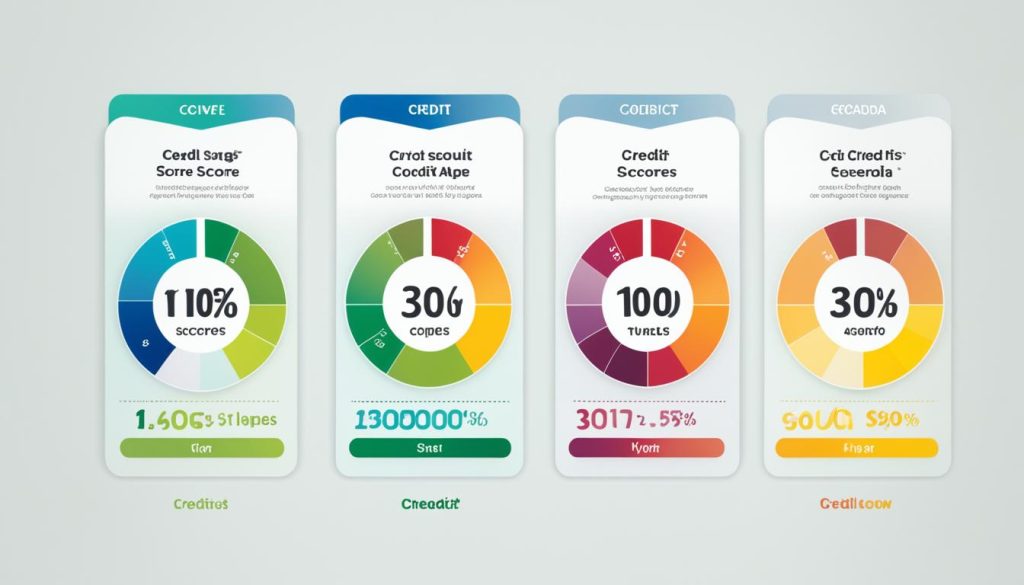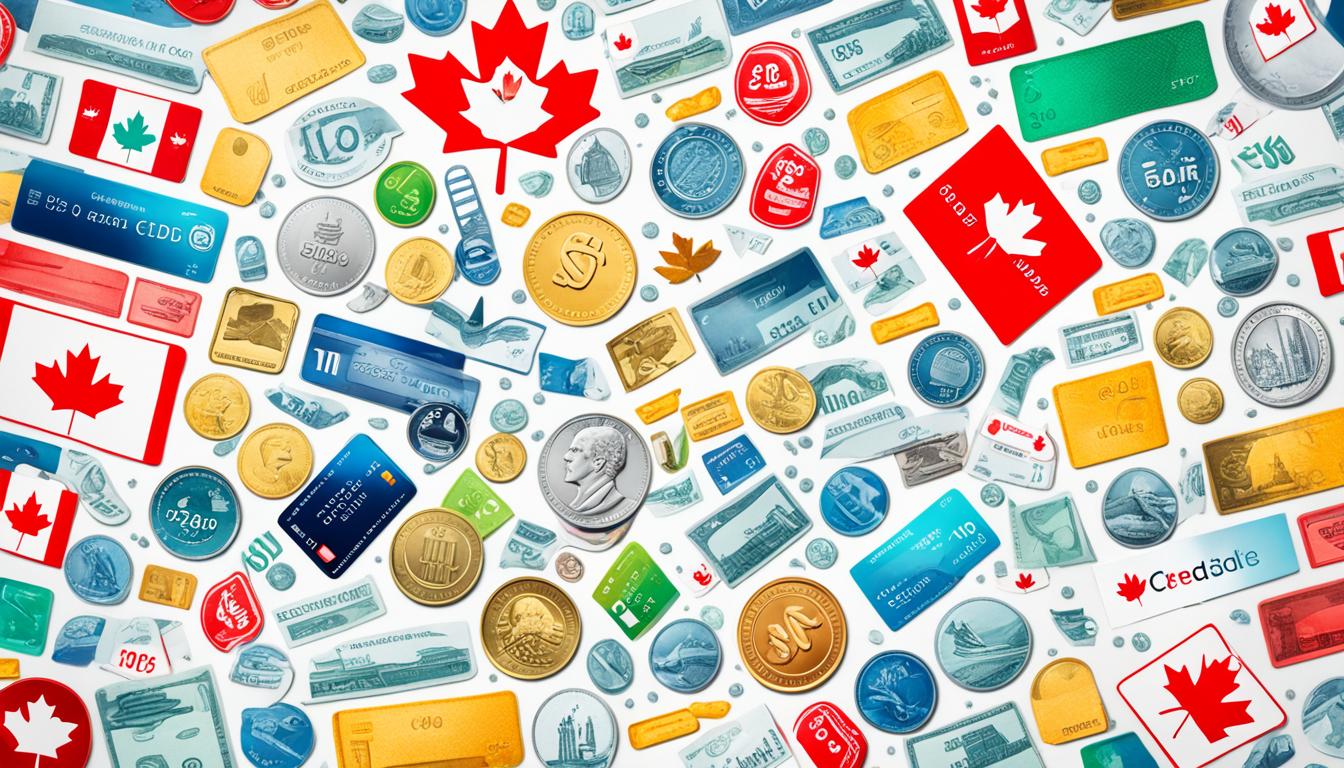Did you know that a mere 1% increase in your credit score can save you over $10,000 in interest payments over the lifetime of a mortgage in Canada? That’s the kind of significant impact a good credit score can have on your financial well-being. Whether you’re looking to secure a loan, rent an apartment, or even land your dream job, your credit score plays a crucial role. Fortunately, there are proven strategies you can employ to improve your credit score in Canada and unlock a world of financial opportunities.
Your payment history is the most important factor for your credit score. To improve your payment history, you should always make your payments on time, make at least the minimum payment if you can’t pay the full amount, contact your lender right away if you think you’ll have trouble paying a bill, and don’t skip a payment even if a bill is in dispute. Your financial institution may also send you electronic alerts when the credit available on your credit card falls below a certain amount, which can help you manage your day-to-day finances.
Importance of a Good Credit Score
In Canada, a good credit score is essential as it can significantly impact your ability to obtain loans, mortgages, and other forms of credit, as well as the interest rates you’ll be offered. Lenders use credit scores to assess the risk of lending to a borrower, and those with higher scores are typically seen as less risky and more likely to make timely payments.
1. Credit Scores Affect Loan Approvals and Interest Rates
A higher credit score can improve your chances of loan approval and result in more favorable interest rates. Canadians with excellent credit scores are often offered better terms on credit products, saving them money in the long run. Conversely, those with lower credit scores may face challenges in securing loans or may be offered higher interest rates, which can make borrowing more expensive.
2. Employers, Landlords, and Others Check Credit Scores
It’s important to note that credit scores in Canada are not just used by lenders. Employers, landlords, and even some service providers may also check an individual’s credit score as part of their evaluation process. A good credit score can be a valuable asset when it comes to finding employment, renting a home, or even obtaining certain services.
Understanding Credit Reports and Credit Scores
It’s important to understand the distinction between credit reports and credit scores in Canada. A credit report is a detailed record of an individual’s credit history, including information about loans, credit cards, and other credit products they have had, as well as how well they have managed those accounts. Credit scores, on the other hand, are numerical representations that provide an assessment of the likelihood of an individual repaying their debts.
1. Distinction Between Credit Reports and Credit Scores
While credit reports act as a historical record of an individual’s credit history, credit scores are forward-looking and provide lenders with an indication of the risk associated with lending to that individual. Credit scores in Canada are typically calculated using information from a consumer’s credit report, such as payment history, credit utilization, and the length of their credit history.
2. Credit Score Range and Impact on Interest Rates
In Canada, credit scores typically range from 300 to 900, with a higher score indicating a lower risk of default. A score of 700 or above is generally considered a good credit score, and individuals with these scores are more likely to qualify for loans, mortgages, and credit cards at the most favorable interest rates. Conversely, those with lower credit scores may face higher interest rates or may even be denied credit altogether.

Factors Affecting Your Credit Score
Your credit score in Canada is influenced by several key factors that lenders consider when evaluating your creditworthiness. Understanding these factors can help you take targeted steps to improve your credit profile and achieve a higher score.
1. Payment History
One of the most important factors that determines your credit score is your payment history. This includes making all of your loan, credit card, and other bill payments on time. Missed or late payments can have a significant negative impact on your score, so it’s crucial to prioritize timely payments.
2. Credit Utilization
Your credit utilization ratio – the amount of credit you’re using compared to your total available credit limit – is another critical factor. Keeping your credit card balances low and your utilization ratio under 30% is recommended to maintain a healthy credit score.
3. Age of Accounts
The age of your credit accounts also plays a role. Lenders generally view longer credit histories more favorably, as they demonstrate your ability to responsibly manage credit over an extended period. Keeping older accounts open, even if you don’t use them frequently, can help boost this factor.
4. Number and Type of Accounts
Having a diverse mix of credit products, such as credit cards, loans, and lines of credit, can be beneficial for your credit score. Lenders like to see that you can responsibly manage different types of credit.
5. Number of Credit Applications
Applying for multiple new credit products in a short period can have a negative impact on your credit score. This is because each application results in a hard inquiry, which temporarily lowers your score. Try to limit the number of credit applications you make to avoid this issue.
By understanding these key factors and taking steps to proactively manage them, Canadians can work towards improving their credit scores and access more favourable credit terms in the future.
Monitoring Your Payment History
Maintaining a strong payment history is crucial for improving your credit score in Canada. One of the most important factors that lenders consider is whether you make your payments on time. By consistently making at least the minimum payment, even if you can’t pay the full amount, you demonstrate your commitment to responsible borrowing and can steadily build your credit.
1. Making Payments on Time
Ensuring that all of your bills are paid by the due date is essential for boosting your credit score. Even a single missed or late payment can have a negative impact, so it’s important to stay on top of your due dates and make timely payments whenever possible. Consider setting up automatic payments or payment reminders to help you stay organized and avoid late fees.
2. Contacting Lenders If Facing Difficulties
If you’re ever in a situation where you’re struggling to make a payment, it’s best to proactively reach out to your lender. Many financial institutions are willing to work with customers experiencing financial hardship to find a solution, such as a temporary payment deferral or modified payment plan. By communicating openly with your lender, you can avoid the more severe consequences of a missed payment, which could further damage your credit rating.
3. Using Electronic Alerts for Payment Reminders
Many financial institutions offer electronic payment reminders and alerts that can help you stay on top of your due dates. These tools can be especially helpful for managing multiple credit accounts and ensuring you never miss a payment. By taking advantage of these features, you can stay organized and maintain a positive payment history, which is key to building and maintaining a strong credit score in Canada.

Using Credit Wisely
Responsible use of credit is crucial for improving and maintaining a strong credit score in Canada. Two key aspects to focus on are avoiding going over your credit limit and maintaining a low credit utilization ratio.
1. Avoiding Going Over Credit Limit
Exceeding your credit limit can have a significant negative impact on your credit score. Lenders view this as a sign of financial stress and increased risk, as it suggests you may be overextended or struggling to manage your debt. To avoid this, it’s important to closely monitor your credit card balances and ensure you don’t surpass your available credit limit.
2. Maintaining Low Credit Utilization Ratio
Your credit utilization ratio, which is the amount of credit you’re using compared to the total amount of credit available to you, is another important factor in determining your credit score. Generally, it’s recommended to keep your credit utilization below 30% of your total available credit. Maintaining a low credit utilization ratio demonstrates to lenders that you’re using credit responsibly and not overextending yourself.
3. Improving Your Credit History
Another crucial aspect of boosting your credit score in Canada is focusing on your credit history. The longer you maintain open credit accounts and actively utilize them, the more favorably it will impact your credit score. Consider keeping older accounts open, even if you don’t use them frequently, as this can help maintain the length of your credit history and demonstrate financial responsibility.
4. Keeping Older Accounts Open
Maintaining longstanding credit accounts, such as credit cards or loans, can work to your advantage when it comes to improving your credit score in Canada. The age of your credit history is an important factor, as lenders view a longer credit history as a sign of financial stability and maturity. By keeping these older accounts active, even if you don’t use them regularly, you can contribute to a stronger credit profile and potentially boost your credit score tips canada, raise credit score canada, and rebuild credit canada.
Considering Transferring Balances Carefully
If you have high-interest credit card balances, you may consider transferring them to a new card with a lower interest rate. This strategy, known as a balance transfer, can improve credit rating canada, credit repair canada, and fix bad credit canada by reducing the amount of interest you pay on your outstanding debt. However, it’s important to exercise caution and carefully evaluate any fees or terms associated with the balance transfer, as this could potentially have a negative impact on your boost credit score canada, increase credit score canada, and credit counselling canada.

How to Improve Your Credit Score in Canada?
In addition to the strategies already mentioned, there are a few other steps Canadians can take to improve their credit scores:
1. Limiting Number of Credit Applications
Applying for too many new credit accounts in a short period can negatively impact your credit score. Each credit application results in a hard inquiry on your credit report, which can temporarily lower your score. To avoid this, be selective when applying for new credit and only apply for accounts you truly need.
2. Differentiating Between Hard and Soft Hits
It’s important to understand the difference between hard and soft credit checks. Hard inquiries, such as those made when you apply for a loan or credit card, can negatively impact your credit score. Soft inquiries, like checking your own credit report or allowing a landlord or employer to review your credit, do not affect your score. Be mindful of the type of credit check being performed to minimize the impact on your credit score.
3. Diversifying Your Credit
Diversifying the types of credit products you have can also be beneficial for improving your credit score in Canada. Rather than relying solely on credit cards, it’s generally better to have a mix of different credit products, such as a credit card, a car loan, and a line of credit.
4. Benefits of Having a Mix of Credit Products
Having a diverse credit portfolio can positively impact your credit score in several ways. Firstly, it demonstrates to lenders that you can responsibly manage a variety of credit types, which can signal your creditworthiness. Secondly, a mix of short-term and long-term credit accounts can help build a more robust credit history, which is an important factor in determining your credit score.
Furthermore, the different credit products can serve different purposes, such as financing a major purchase (like a car) or providing flexibility for daily expenses (through a line of credit). This versatility can help you better manage your financial needs and maintain a healthy credit profile over time.
By diversifying your credit portfolio, you can demonstrate to lenders that you are a responsible borrower who can handle a variety of credit products. This can ultimately lead to a higher credit score, better loan terms, and greater financial opportunities in Canada.
5. Reviewing Credit Reports Regularly
Regularly reviewing your credit reports from both Equifax and TransUnion is an essential step in maintaining and improving your credit score in Canada. This allows you to check for any errors or signs of identity theft and fraud, which can negatively impact your credit standing.
6. Checking for Errors and Fraud
Carefully scrutinizing your credit reports can help you identify any inaccuracies or unauthorized activities that may be dragging down your credit score. If you discover any errors, such as incorrect account information or fraudulent entries, you can dispute them with the credit bureaus to have them corrected.
7. Utilizing Free Credit Report Services
Canadians can access their credit reports from Equifax and TransUnion for free once a year. Taking advantage of these free services enables you to regularly monitor your credit score and catch any issues before they become more significant problems. Additionally, some financial institutions and credit card providers offer free credit monitoring as part of their customer services, which can be a convenient way to stay on top of your credit health.
Best Practices for Improving Credit Score
Along with the strategies we’ve already discussed, Canadians can adopt a few additional best practices to enhance their credit scores. These include having a credit card in your own name, considering a second credit card, being cautious with rewards programs, and avoiding missed payments.
1. Having a Credit Card in Your Name
Establishing a credit card in your own name is an important step in building and maintaining a strong credit history in Canada. This demonstrates to lenders that you can responsibly manage credit, which can positively impact your credit score over time.
2. Considering a Second Credit Card
Obtaining a second credit card can also be beneficial for improving your credit score. This can help diversify your credit mix and lower your overall credit utilization ratio, both of which are important factors in determining your credit score.
3. Being Cautious with Rewards Programs
While rewards credit cards can provide valuable benefits, it’s essential to use them wisely. Avoid overspending or carrying high balances on these cards, as this can negatively impact your credit utilization ratio and ultimately your credit score.
4. Avoiding Missed Payments
Perhaps the most critical best practice for Canadians is to avoid missed payments at all costs. Payment history is the single most important factor in determining your credit score, so making sure all your bills are paid on time is crucial for maintaining a strong credit profile.

Conclusion
In conclusion, improving your credit score in Canada requires a multifaceted approach that combines responsible financial habits and proactive strategies. By consistently monitoring your payment history, utilizing credit wisely, maintaining a diverse credit portfolio, and regularly reviewing your credit reports, you can take meaningful steps towards building and sustaining a strong credit profile.
Developing financial discipline, such as making timely payments and keeping credit utilization low, is crucial for enhancing your credit score tips canada. Additionally, diversifying your credit mix by having a mix of credit products, including credit cards, loans, and lines of credit, can positively impact your raise credit score canada and build credit history canada.
Moreover, regularly checking your credit reports from Equifax and TransUnion for any errors or signs of fraud is essential for maintaining improve credit rating canada and achieve good credit canada. By staying vigilant and addressing any discrepancies promptly, you can ensure the accuracy of your credit information and protect your financial well-being.
Ultimately, improving your credit score in Canada is an ongoing process that requires diligence, patience, and a proactive approach. By implementing the strategies outlined in this article, you can boost credit score canada, increase credit score canada, and position yourself for greater financial opportunities in the future.
FAQ
1. How can I build my credit fast in Canada?
To build your credit fast in Canada, focus on making all payments on time, keeping credit utilization low, and maintaining a diverse credit mix. Additionally, regularly review your credit reports and dispute any errors or signs of identity theft.
2. How can I raise my credit score in 30 days?
Raising your credit score in 30 days is challenging, but you can take steps to improve it, such as making all payments on time, keeping credit utilization low, and limiting new credit applications. However, building a strong credit history takes time, so focus on sustainable long-term strategies.
3. How do I get an 800 credit score in 45 days?
Achieving an 800 credit score in just 45 days is highly unlikely. Building an excellent credit score takes time and consistent financial responsibility. Focus on making on-time payments, maintaining low credit utilization, and avoiding new credit applications to gradually improve your score over several months or years.
4. Is 700 a good credit score in Canada?
In Canada, a credit score of 700 or higher is generally considered a good credit score. Scores above 700 indicate a low risk to lenders and can help you qualify for better interest rates and credit products.
5. Is a 900 credit score possible in Canada?
A credit score of 900 is technically possible in Canada, but it is extremely rare. Most lenders consider a score of 800 or above to be excellent. Achieving a 900 credit score requires consistently responsible financial behavior over many years.
6. Does anyone have a 900 credit score in Canada?
While a 900 credit score is technically possible in Canada, it is incredibly rare. Most Canadians with excellent credit scores will have a score in the 800-850 range, which is already considered exceptional.
7. How rare is an 800 credit score in Canada?
An 800 credit score is considered excellent in Canada and is relatively rare. Only a small percentage of Canadians (around 20-25%) have a credit score of 800 or above. Maintaining an 800 credit score requires years of responsible financial management.
8. What is Canada’s average credit score?
The average credit score in Canada is around 650-720, depending on the credit scoring model used. This range is considered a good to excellent credit score, though there is room for improvement for many Canadians.
9. What is a good credit score for my age in Canada?
There is no one-size-fits-all good credit score based on age in Canada. Generally, the older you are, the higher your credit score should be as you’ve had more time to establish a strong credit history. However, the most important factor is maintaining responsible financial habits, regardless of your age.




